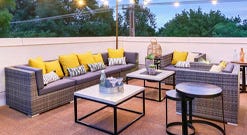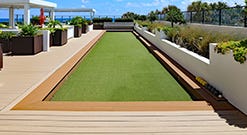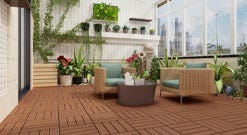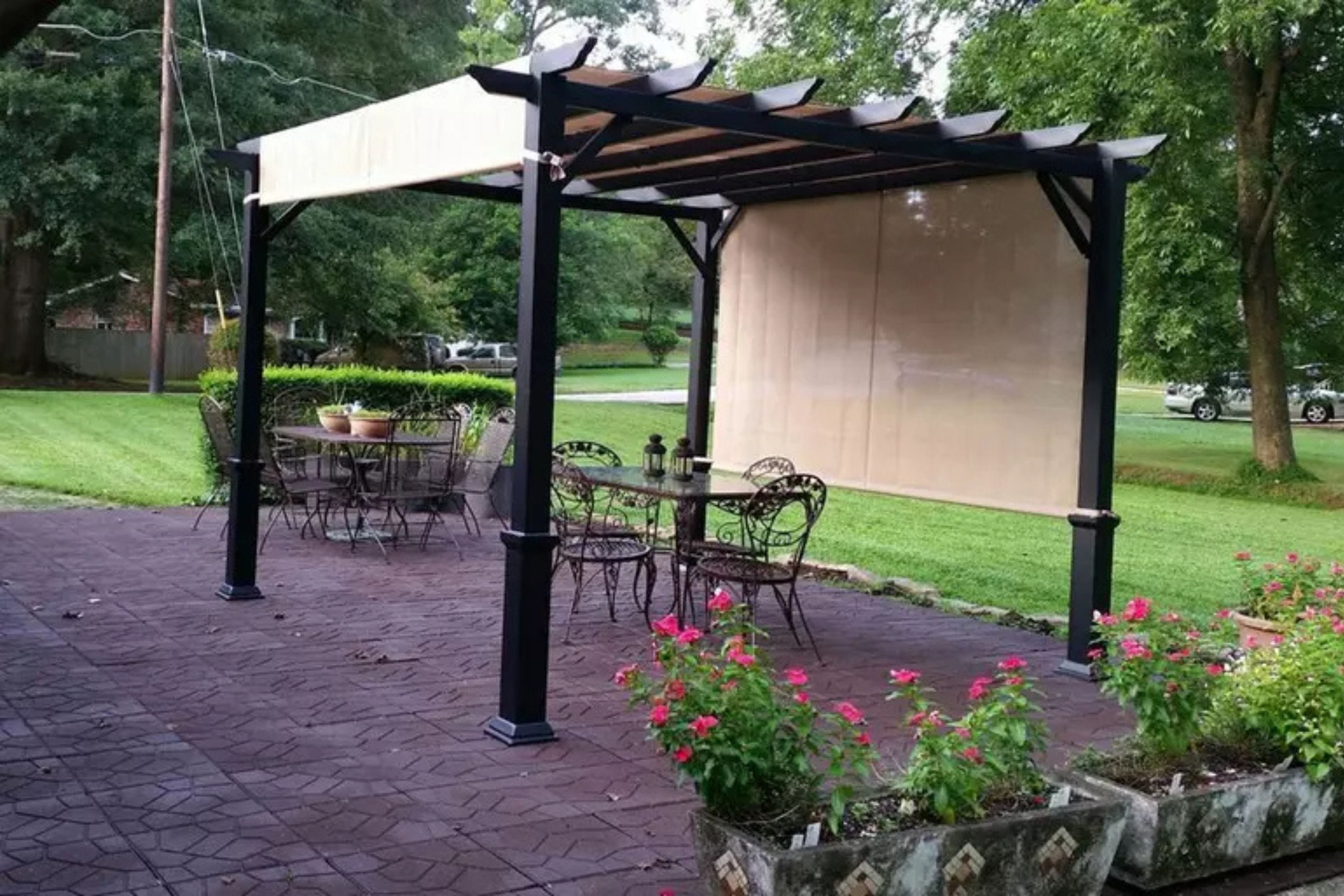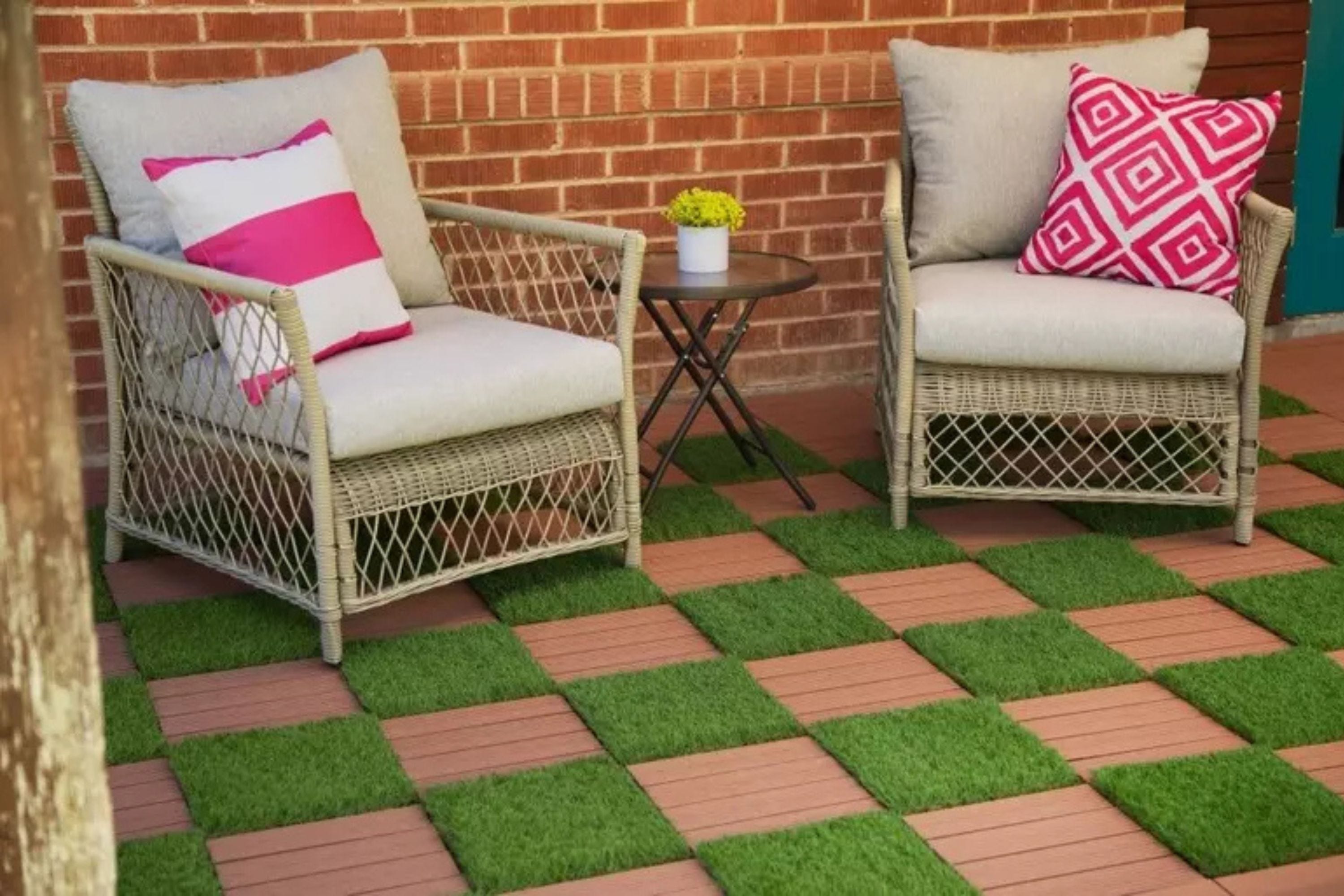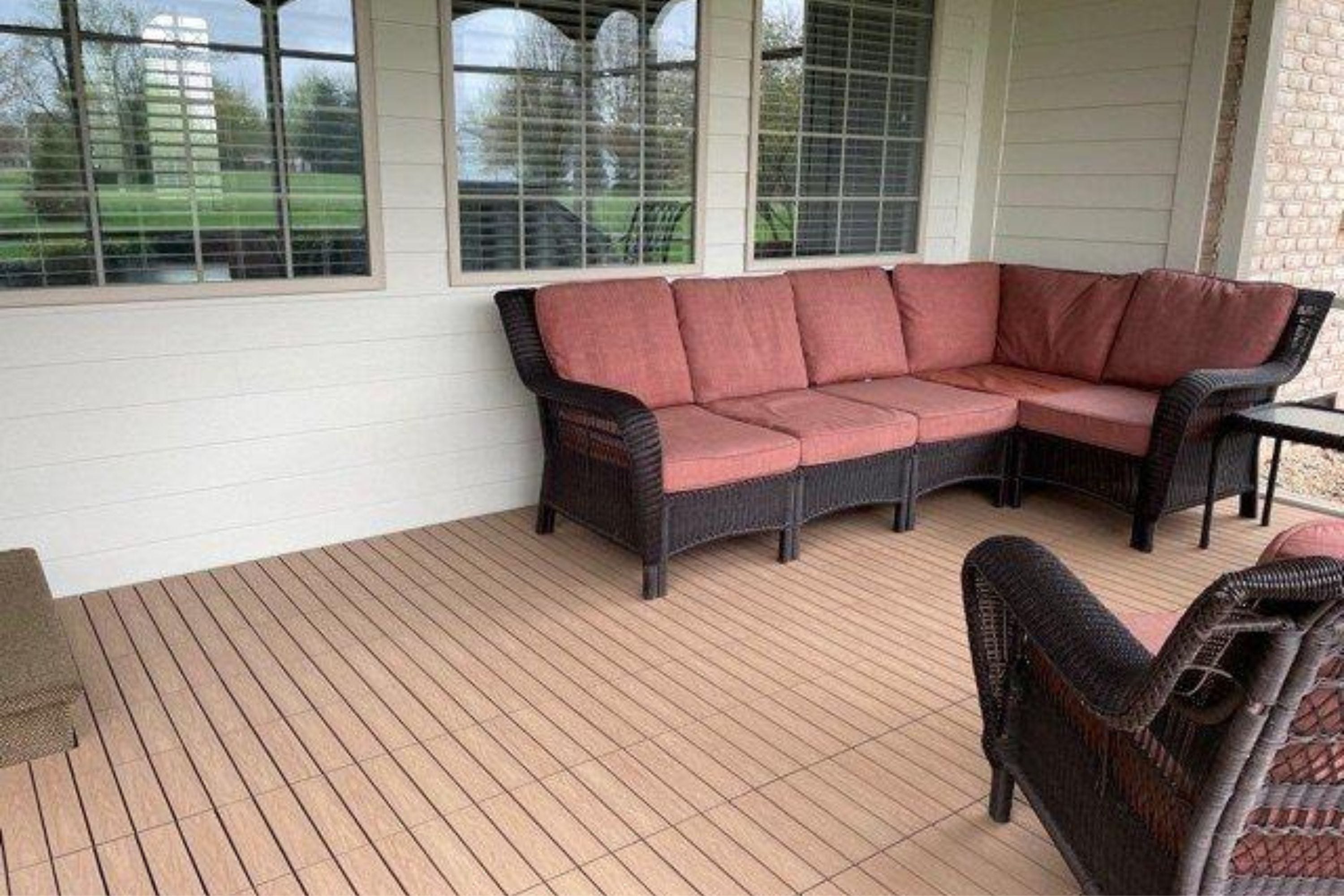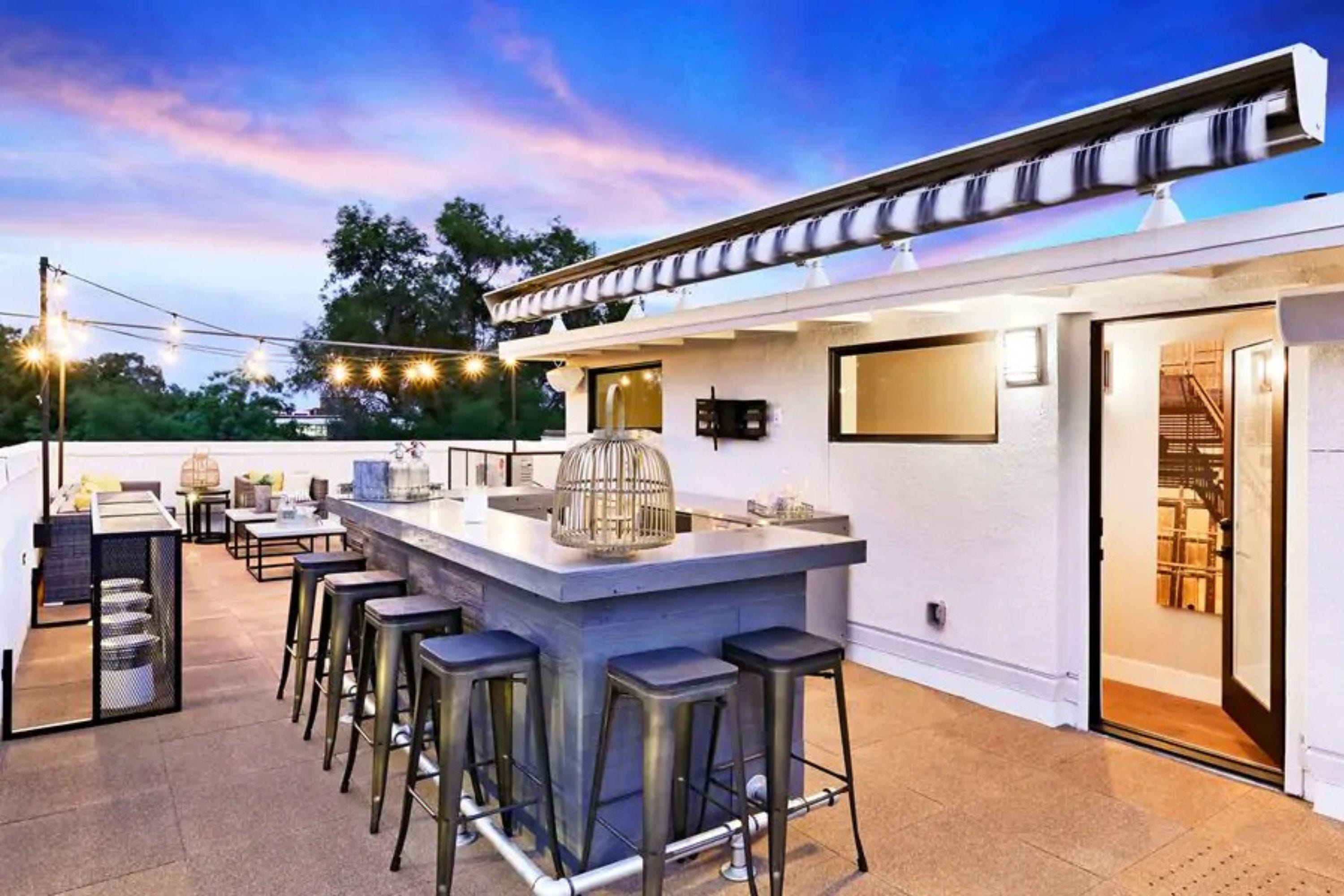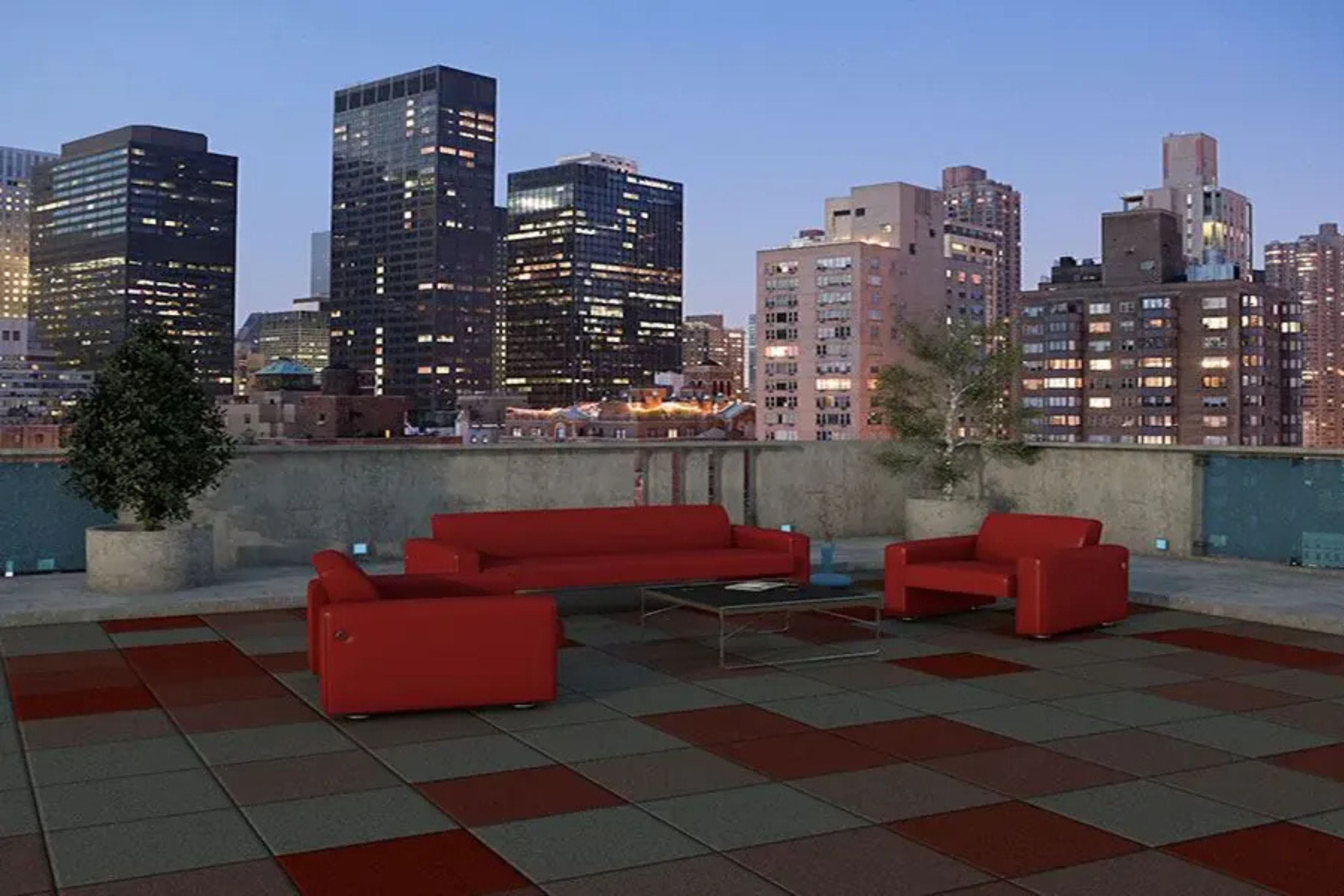
What is Rooftop Deck Flooring?
Rooftop deck flooring is specially designed to not puncture or tear the waterproof membrane of a flat top roof. Most modern flat top roofs are sealed with a single-ply rubber membrane that is meant to protect the roof from leaks and water damage.
Because of this sensitivity, rooftop flooring must be chosen carefully to prevent damage to flat top roofs. Rooftop deck flooring that has sharp edges and sharp undersides are probably unsuitable for a rooftop due to the threat of puncture.
A good rooftop flooring will help protect your roof, is weather and UV resistant, and extremely durable. Let’s look at other important features of rooftop flooring.
Features of Rooftop Deck Flooring
A good rooftop deck flooring has several different features that help protect the roof. Rooftop flooring should also be extremely durable and able to weather the… well, weather. Here are a few key features to keep in mind when shopping for the perfect rooftop deck flooring:
✅ Anti-Slip: Rooftops are going to be hit with rain pretty often depending on where you live. A good rooftop flooring will be anti-slip to allow guests to walk freely without falling.
✅ Shock Absorbing: If you’re hoping to be on your rooftop a lot, you’ll want something that’s comfortable under foot. Rooftop flooring with good shock absorption is softer and more comfortable to walk on.
✅ Insulating: Uncovered rooftops are often colder and harder on the surface. You can’t walk on top of it without risking rooftop damage. Rooftop flooring is insulating, creating a warmer and softer environment. It helps protect the membrane of a rooftop, keeping it from being damaged.
✅ Mold/Mildew Resistant: Rooftop flooring should be weatherproof. At some point it’s going to be pelted by rain and the last thing you want are green fuzzy things growing on top of it. That’s why all rooftop flooring is mold and mildew-resistant.
✅ UV Resistant: Rooftop flooring is supposed to stay attractive for years to come. That’s why it’s important to double check your rooftop flooring choice to make sure it is UV stable. That means the color will not fade instantly in the sun. It’ll stay vivid for years.
Types of Rooftop Deck Flooring
Composite Deck Tiles
Deck tiles are one of the more expensive ways to deck out a rooftop (pun intended), but it sure does look nice. In fact, when you think of rooftop flooring, you probably think of a rooftop deck. Unlike real wood, composite deck tiles won’t attract bugs and decompose over time. It requires little to no care. Just sit back, hang out, and enjoy.
Pros of Rooftop Deck Flooring
At this point, you might be wondering why you even need rooftop flooring. After all, isn’t it just an extra expense? Not quite! In fact, rooftop flooring is absolutely necessary for any rooftop activity. Without it, the rooftop may be severely damaged. Here are some pros to having rooftop flooring:
✅ Attractive: The truth is, using rooftop flooring makes your rooftop more attractive for entertaining. Other methods of using the roof for entertaining just don’t look as good, nor work as well.
✅ Protects Your Roof: Adding to that point above, you probably shouldn’t use your rooftop for entertaining if you don’t have rooftop flooring to protect it. Putting chairs and tables directly on the roofing surface could permanently damage the roof, causing water leaks.
✅ Additional Home Space: The best part of rooftop flooring is that it adds usable square footage to your home. It’s an extra place to decorate and hang out on outside your home. You can use it for yourself, or use it for get-togethers or parties.
✅ Easy to Install: Rooftop tiles are easy to install yourself, so there’s no need to hire a professional for this project!
FAQs
Q) Will my rooftop deck flooring get hot?
A) With full exposure to the sun, rooftop flooring will get hot, so you might not want to walk barefoot on it in the middle of summer. However, there are a few steps you can take to help keep the heat down.
✅ Hose it down with water
✅ Choose lighter colors that stay cooler in direct sunlight
✅ Pick a special order UV reflectant color for a cooler flooring
✅ Use umbrellas or other shade creators for cooler hangout areas
Q) Will my rooftop deck flooring color fade?
A) For the longest-lasting color, we suggest finding a rooftop flooring that is UV-resistant. This will ensure that the color stays bright for as long as possible. After a certain amount of time, fading might occur.
Q) How do I clean my rooftop deck flooring?
A) Rooftop flooring can be cleaned by sweeping or vacuuming dust and debris off the surface. You may also use a hose, wop, or power washer to further clean any mud or dirt off the surface.
Q) Does water get trapped underneath the roof deck flooring?
A) Depending on the type of rooftop flooring you purchase, the flooring will either be non-porous or water-permeable. Non-porous tiles, such as our Life Floor Slate Tiles, are water-tight, and water will evaporate from the surface. Tiles that are water permeable allow water to flow through them, and that water will eventually evaporate. All rooftop tiles are mildew and mold-resistant, so you don't have to worry about anything growing on your rooftop that you didn't plant!
Q) Are these products safe over any flat-top roof?
A) Flooring specially made for rooftops will not damage your rooftop. Rooftops can be damaged by sharp edges or by walking on a rooftop without a flooring in place. Rooftop flooring can protect your roof from damage. These products are safe for built-up roofs, modified bitumen roofs, and single membrane roofs.
Customer Reviews
"My Husband and I installed this in an afternoon. We do not do a lot of DIY projects, but we had a Dewalt reciprocating and circular saw that we used for cutting some of the pieces. We found this to be an easy DIY project and are very happy with the results. We got the color Canadian Maple and we are happy with the color. Thanks to Flooring Inc for the samples and fast delivery of our final choice on product."
- Becky N.
"Flagstone rubber pavers were delivered promptly, and I was really impressed with the packing of the shipment. Installation was a breeze, I didn’t even glue them down, and they lay beautifully. They look and feel fantastic; they also dampen the sound in the room. We couldn’t be more pleased with Rubber Flooring Inc."
- William
Other Helpful Rooftop Decking Content
Rooftop deck flooring can transform your average rubber rooftop into a place great for hangouts and entertainment. If you’re hoping to create an awesome hangout space on your roof, start with your flooring. This guide will teach you everything you need to know about Rooftop Decking.
If you’re renovating your deck or building one from scratch, you need to start by finding the best material for your outdoor space. This guide can help with that! In addition to covering some of the most popular deck ideas, you’ll also get tips on the right solution for your space, whether you’re looking for sunroom flooring, rooftop decking, or flooring to go around your pool.




